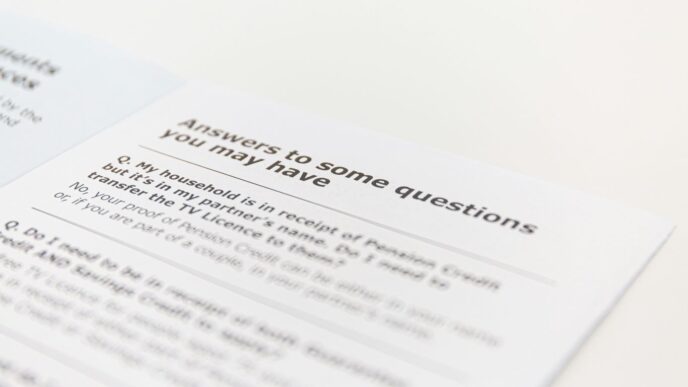Getting ready for a content writing interview can feel like a lot. You know you can write, but how do you show that to a potential employer? It’s about more than just putting words on paper. You need to talk about your process, how you handle feedback, and if you know your way around things like SEO and different writing tools. We’ve put together some common content writing interview questions to help you prepare, so you can walk into your next interview feeling confident and ready to impress.
Key Takeaways
- Understand what makes good content and how to measure its success, focusing on usefulness, engagement, and credibility.
- Be ready to explain your entire writing process, from the initial idea to the final edit, and how you adapt your style for different audiences.
- Show you know how to use SEO basics and research your target audience to create content that performs well.
- Prepare to talk about how your writing has helped businesses achieve their goals and how you stay current with content trends.
- Always have your best writing samples ready in a portfolio and show you’re reliable and have a good work ethic.
Understanding Core Content Writing Competencies

So, what exactly makes content good? It’s not just about stringing words together, right? We’re talking about creating pieces that actually do something for the reader and for the business. Think about it: if your content doesn’t help someone solve a problem, learn something new, or feel a connection, it’s probably just taking up digital space.
Defining High-Quality Content and Its Metrics
When we talk about high-quality content, we mean stuff that’s accurate, well-researched, and genuinely useful. It needs to be easy to read and understand, and it should feel like it comes from someone who actually knows their stuff. For web content, this often ties into Google’s E-E-A-T guidelines – Experience, Expertise, Authoritativeness, and Trustworthiness. Basically, show you’ve done your homework and you’re not just making things up.
How do you measure if it’s working? Well, it depends on the goal, doesn’t it? Are you trying to get more people to visit your site? Then traffic numbers are key. Want them to sign up for something? Lead generation rates matter. Or maybe you just want people to stick around and read more? Time on page and bounce rate can tell you that. It’s about matching what you measure to what you wanted the content to achieve in the first place.
Here’s a quick look at some common metrics:
- Traffic: How many people are viewing your content?
- Engagement: Likes, shares, comments, time spent reading.
- Conversions: Sign-ups, downloads, purchases that happen because of the content.
- SEO Performance: Keyword rankings, organic traffic.
Essential Components of Effective Web Content
Good web content needs to be more than just words on a page. It has to grab attention fast and keep it. This means having a clear headline that tells people what they’re getting, and then structuring the content so it’s easy to scan. Think headings, subheadings, and short paragraphs. Nobody wants to stare at a wall of text.
Beyond that, the content itself needs to be useful. Does it answer the question someone typed into Google? Does it explain a complex topic simply? And importantly, is it credible? Backing up claims with data or linking to reputable sources really helps build trust. Plus, making sure it’s free of typos and grammatical errors is just basic professionalism.
The Role of Engagement, Utility, and Credibility
These three – engagement, utility, and credibility – are like the pillars holding up good content. Utility is about being helpful. Does your content solve a problem or answer a question? Engagement is about keeping the reader interested. This can come from a compelling story, a relatable tone, or even just a well-organized layout that makes it easy to read. Credibility is about trust. If people don’t believe what you’re saying, they’ll click away.
Think about it like this:
- Utility: Providing clear, actionable advice.
- Engagement: Using a conversational tone and asking questions.
- Credibility: Citing sources and demonstrating real-world experience.
When all three are working together, you get content that people not only read but also remember and act upon.
Showcasing Your Writing Process and Adaptability

When you’re interviewing for a content writing role, they really want to know how you actually get things done. It’s not just about being a good writer; it’s about being a reliable one who can handle different jobs. So, be ready to talk about your workflow.
Describing Your Writing Process from Start to Finish
Think about how you take an idea and turn it into a finished piece. It usually starts with understanding the goal, right? Then comes the research – digging into the topic to make sure you know your stuff. After that, it’s outlining, drafting, and then the really important part: editing and proofreading. Being able to explain this clearly shows you’re organized and thorough.
Here’s a typical breakdown:
- Briefing & Understanding: What’s the purpose of this content? Who are we talking to? What’s the main message?
- Research: Gathering facts, stats, and different viewpoints. This might involve looking at competitor content or talking to experts.
- Outlining: Structuring the piece logically. This helps keep the writing focused and makes sure all key points are covered.
- Drafting: Getting the first version down. Don’t worry too much about perfection here, just write.
- Editing & Revising: Improving clarity, flow, and accuracy. This is where you refine sentences and paragraphs.
- Proofreading: Catching any typos, grammar errors, or punctuation mistakes. A fresh pair of eyes can be helpful here.
Handling Feedback and Criticism Constructively
Nobody gets it perfect on the first try, and that’s okay. Interviewers want to see that you can take feedback without getting defensive. It means you’re open to improving and working with others. When someone gives you notes, try to understand their point of view. Ask questions if something isn’t clear. Then, make the changes needed, but also feel free to explain why you might have done something a certain way if you think it’s stronger.
It’s a good idea to show you see feedback as a way to make the content better, not as a personal critique. You can say something like, "I welcome feedback because it helps me see the piece from a different angle and make it stronger for the reader." Being able to discuss a time you received feedback and how you used it is a great way to answer this.
Demonstrating Versatility in Tone, Style, and Format
Content writers often have to write for different audiences and purposes. One day you might be writing a formal white paper, and the next, a casual social media post. You need to show you can switch gears easily. Think about how you adjust your language, sentence structure, and overall tone to fit the brand and the audience. For example, writing for a B2B audience requires a different approach than writing for a consumer audience. Being able to adapt your style shows you’re a flexible and valuable asset to any team.
Navigating Technical Aspects of Content Creation
Okay, so you’ve got the writing chops, but can you handle the tech side of things? In today’s digital world, just writing well isn’t always enough. You need to know how to make your content work for you online.
Incorporating SEO Strategies into Your Writing
This is a big one. Search Engine Optimization, or SEO, is basically how you help search engines like Google find and rank your content. It’s not just about stuffing keywords everywhere, though. It’s more about making your content useful and relevant to people, while also using the right terms so search engines understand what it’s about. Think about using keywords naturally in your headings, subheadings, and throughout the text. Also, don’t forget about meta descriptions and image alt text – these little things really help.
Here’s a quick rundown of what matters:
- Keyword Research: Finding out what terms people actually search for.
- On-Page Optimization: Using those keywords in your titles, headings (like H1, H2, H3), and body text.
- Meta Descriptions & Titles: Crafting compelling snippets that appear in search results.
- Image Optimization: Using descriptive alt text so search engines (and visually impaired readers) know what the image is.
- Internal & External Linking: Connecting your content to other relevant pages on your site and reputable external sources.
Understanding Target Audience Research
Before you even start writing, you really need to know who you’re writing for. Who is your ideal reader? What are their problems? What kind of language do they use? Understanding your audience helps you tailor your tone, style, and the information you provide. It’s about making sure your content actually connects with the people you want to reach. You can find this out through surveys, looking at website analytics, or even just by reading comments on similar content. Getting this right means your content is more likely to be read and shared. For example, if you’re writing about a new gadget for tech enthusiasts, you can use more technical terms. But if you’re explaining the same gadget to a general audience, you’ll need to simplify things a lot. Knowing your audience is key to making your content effective, and it’s something you can learn more about by looking at how successful technology journalism is done.
Familiarity with Content Management Systems and Tools
Most jobs will involve using a Content Management System, or CMS. WordPress is probably the most common one you’ll encounter, but there are others like Joomla, Drupal, or even custom-built systems. You don’t need to be a developer, but knowing how to upload content, format it correctly, add images, and maybe even do some basic SEO tweaks within the CMS is super helpful. It shows you can take your writing from a document to a live, published piece. Being comfortable with these tools means you can manage content efficiently and make updates without always needing someone else to do it for you.
Highlighting Your Impact and Industry Awareness
Discussing Content That Drove Business Goals
When they ask about content that made a difference, they really want to see if you get how writing connects to the company’s bottom line. It’s not just about pretty words; it’s about making things happen. Think about a time your writing actually moved the needle. Maybe it was a blog post that brought in a ton of new leads, or a product description that clearly boosted sales. Be ready to talk specifics. What was the goal? What did you write? And most importantly, how did you measure success? Using numbers here is key. For instance, you could say, "I wrote a series of email newsletters for a client that aimed to increase repeat purchases. By focusing on clear calls-to-action and highlighting customer benefits, we saw a 15% uplift in sales from that segment over three months." It shows you understand the business side of content.
Staying Updated with Content Marketing Trends
Content marketing changes fast, right? What worked last year might not be the best approach today. So, interviewers want to know you’re paying attention. It’s not enough to just write; you need to write what’s current and effective. How do you keep up? Do you read industry blogs, subscribe to newsletters, or maybe attend webinars? Mentioning specific sources shows you’re serious about this. You could say, "I make it a point to read publications like Content Marketing Institute and MarketingProfs daily. I also follow key industry leaders on LinkedIn and subscribe to several newsletters to catch the latest strategies and algorithm changes." It’s also good to mention how you apply this knowledge. "This helps me adapt my approach, like incorporating more video scripts or focusing on user-generated content when those trends emerge."
Explaining Your Passion for Content Writing
This is where you can let your personality shine a bit. Why content writing? What gets you excited about putting words together? It’s more than just a job for people who are good at it. Maybe you love the challenge of explaining complex topics simply, or you enjoy finding the perfect word to convey a specific emotion. Talk about what drives you. "I genuinely enjoy the process of taking a complex idea and breaking it down into something clear and engaging for a reader. I find it really satisfying when a piece of content helps someone learn something new or solve a problem they’re facing." Sharing a personal anecdote or a specific type of content you love creating can also be effective. "I’m particularly drawn to long-form, educational content because it allows for a deeper exploration of a topic and can build real trust with an audience."
Preparing Your Portfolio and Demonstrating Professionalism
Your portfolio is your calling card in the content writing world. It’s where you show, not just tell, what you can do. Think of it as your personal gallery of words, showcasing the range and quality of your work. When putting it together, be selective. Don’t just dump everything you’ve ever written; pick your strongest pieces that align with the type of work you’re seeking.
Showcasing Your Best Writing Samples
When selecting samples, aim for variety. Include different formats like blog posts, articles, website copy, or even social media snippets if relevant. It’s also a good idea to show how you’ve adapted your tone and style for different audiences. For instance, you might have a piece that’s very formal and technical, and another that’s casual and conversational. Quantifying your impact with data, where possible, makes your samples even more compelling. Did a blog post you wrote increase website traffic by 20%? Did your landing page copy lead to a 15% rise in conversions? Include these details. If you’re just starting out, create spec pieces or volunteer your writing services to build your portfolio. Remember to organize your portfolio logically, perhaps by content type or industry, making it easy for potential employers to find what they’re looking for. You might even consider creating a simple website for your portfolio, which looks very professional. It’s also a good place to include testimonials from past clients or colleagues if you have them.
Maintaining a Strong Work Ethic
Beyond the writing itself, how you conduct yourself professionally matters a great deal. This means being reliable, meeting deadlines, and communicating clearly. If you’re working on multiple projects, having a system to manage your tasks is key. You could use a simple to-do list, or more advanced project management software. The important thing is to show you’re organized and can handle your workload without dropping the ball. Being open to feedback is also a big part of a good work ethic. It shows you’re willing to learn and improve. When you receive criticism, try not to take it personally. Instead, view it as an opportunity to refine your work. Discussing any gaps in understanding with clients or supervisors, as mentioned in some advice, is also a sign of maturity and professionalism. It’s better to ask clarifying questions upfront than to produce something that misses the mark.
Researching the Company and Its Content Strategy
Before any interview, do your homework. Look at the company’s website, their blog, their social media presence, and any other content they’re putting out. What’s their tone? Who are they trying to reach? What seems to be working well, and where might there be opportunities for improvement? Understanding their current content strategy allows you to tailor your answers and even suggest ideas that show you’ve thought about how you can contribute. For example, if their blog is very active but their website copy feels a bit dated, you could mention your experience in refreshing website content. This kind of preparation demonstrates genuine interest and a proactive approach. It also helps you gauge if the company’s content style is a good fit for your own skills and preferences. Thinking about how your work can support their business goals is also a smart move. If you can connect your writing abilities to tangible outcomes like increased engagement or better brand awareness, you’ll make a strong impression. Learning how to create effective video content, for instance, could be a valuable skill to mention if the company uses video in its marketing efforts [f69e]. Understanding their content ecosystem helps you position yourself as a strategic partner, not just a writer.
Wrapping Up Your Interview Prep
So, you’ve gone through a bunch of questions and tips for landing that content writing gig. Remember, knowing what they’re looking for and showing them you can do the job is half the battle. Practice talking about your writing, how you research, and how you handle feedback. It’s all about showing them you’re the right fit. Good luck out there!
Frequently Asked Questions
What makes content really good?
Good content is easy to read, interesting, and gives you the information you need. It should also be trustworthy and show that the writer knows what they’re talking about. Think about making it helpful and fun to read!
How do you make sure your writing is interesting for people?
To keep readers hooked, I use clear headings, interesting pictures, and break up the text so it’s not overwhelming. I also try to write in a way that speaks directly to what the reader wants or needs.
What’s your process for writing something new?
First, I figure out what the topic is and who I’m writing for. Then, I do some research to gather facts. After that, I create an outline, write a first draft, and then revise it to make it better, checking for clarity and errors.
How do you handle it when someone gives you feedback on your writing?
I see feedback as a chance to improve. I listen carefully to what people say, ask questions if I need to, and then use their suggestions to make my writing stronger and clearer.
How do you make sure your writing is found on search engines like Google?
I use words that people search for (keywords) in my writing, especially in titles and headings. I also make sure the content is well-organized and provides good information, which search engines like.
Why do you enjoy writing content?
I love learning new things and sharing that knowledge with others. It’s rewarding to create something that helps people understand a topic better or solves a problem they have. Plus, I enjoy the challenge of finding the best way to say something.














